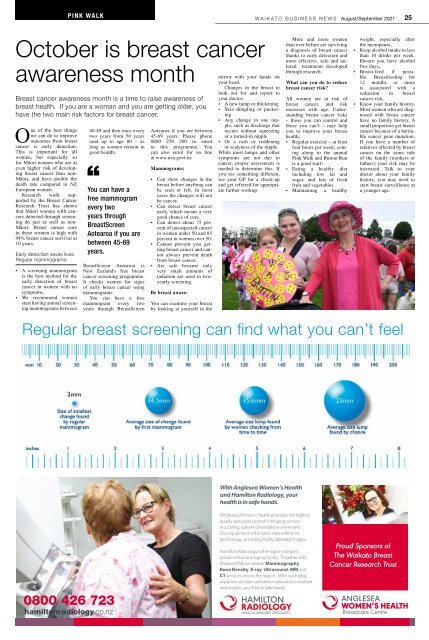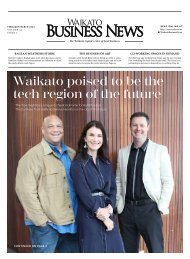Waikato Business News August/September 2021
Waikato Business News has for a quarter of a century been the voice of the region’s business community, a business community with a very real commitment to innovation and an ethos of co-operation.
Waikato Business News has for a quarter of a century been the voice of the region’s business community, a business community with a very real commitment to innovation and an ethos of co-operation.
You also want an ePaper? Increase the reach of your titles
YUMPU automatically turns print PDFs into web optimized ePapers that Google loves.
PINK WALK<br />
WAIKATO BUSINESS NEWS <strong>August</strong>/<strong>September</strong> <strong>2021</strong><br />
25<br />
October is breast cancer<br />
awareness month<br />
Breast cancer awareness month is a time to raise awareness of<br />
breast health. If you are a woman and you are getting older, you<br />
have the two main risk factors for breast cancer.<br />
One of the best things<br />
we can do to improve<br />
outcomes from breast<br />
cancer is early detection.<br />
This is important for all<br />
women, but especially so<br />
for Māori women who are at<br />
even higher risk of developing<br />
breast cancer than non-<br />
Māori, and have double the<br />
death rate compared to NZ<br />
European women.<br />
Research work supported<br />
by the Breast Cancer<br />
Research Trust has shown<br />
that Māori women with cancers<br />
detected through screening<br />
do just as well as non-<br />
Māori. Breast cancer cure<br />
in these women is high with<br />
94% breast cancer survival at<br />
10 years.<br />
Early detection saves lives<br />
Regular mammograms<br />
• A screening mammogram<br />
is the best method for the<br />
early detection of breast<br />
cancer in women with no<br />
symptoms.<br />
• We recommend women<br />
start having annual screening<br />
mammograms between<br />
40-49 and then once every<br />
two years from 50 years<br />
(and up to age 80 – as<br />
long as women remain in<br />
good health).<br />
You can have a<br />
free mammogram<br />
every two<br />
years through<br />
BreastScreen<br />
Aotearoa if you are<br />
between 45-69<br />
years.<br />
BreastScreen Aotearoa is<br />
New Zealand's free breast<br />
cancer screening programme.<br />
It checks women for signs<br />
of early breast cancer using<br />
mammograms.<br />
You can have a free<br />
mammogram every two<br />
years through BreastScreen<br />
Aotearoa if you are between<br />
45-69 years. Please phone<br />
0800 270 200 to enrol<br />
in this programme. You<br />
can also enrol for on line<br />
at www.nsu.govt.nz<br />
Mammograms;<br />
• Can show changes in the<br />
breast before anything can<br />
be seen or felt. In most<br />
cases the changes will not<br />
be cancer.<br />
• Can detect breast cancer<br />
early, which means a very<br />
good chance of cure.<br />
• Can detect about 75 percent<br />
of unsuspected cancer<br />
in women under 50 and 85<br />
percent in women over 50.<br />
• Cannot prevent you getting<br />
breast cancer and cannot<br />
always prevent death<br />
from breast cancer.<br />
• Are safe because only<br />
very small amounts of<br />
radiation are used in twoyearly<br />
screening.<br />
Be breast aware:<br />
You can examine your breast<br />
by looking at yourself in the<br />
mirror with your hands on<br />
your head.<br />
Changes in the breast to<br />
look out for and report to<br />
your doctor;<br />
• A new lump or thickening<br />
• Skin dimpling or puckering<br />
• Any change in one nipple,<br />
such as discharge that<br />
occurs without squeezing<br />
or a turned-in nipple<br />
• Or a rash or reddening<br />
or scalyness of the nipple<br />
While most lumps and other<br />
symptoms are not due to<br />
cancer, proper assessment is<br />
needed to determine this. If<br />
you see something different,<br />
see your GP for a check-up<br />
and get referred for appropriate<br />
further workup.<br />
More and more women<br />
than ever before are surviving<br />
a diagnosis of breast cancer<br />
thanks to early detection and<br />
more effective, safe and tailored<br />
treatments developed<br />
through research.<br />
What can you do to reduce<br />
breast cancer risk?<br />
All women are at risk of<br />
breast cancer, and risk<br />
increases with age. Understanding<br />
breast cancer risks<br />
– those you can control and<br />
those you can’t – may help<br />
you to improve your breast<br />
health;<br />
• Regular exercise – at least<br />
four hours per week; coming<br />
along to the annual<br />
Pink Walk and Button Run<br />
is a good start!<br />
• Eating a healthy diet<br />
including low fat and<br />
sugar, and lots of fresh<br />
fruit and vegetables,<br />
• Maintaining a healthy<br />
weight, especially after<br />
the menopause,<br />
• Keep alcohol intake to less<br />
than 10 drinks per week.<br />
Ensure you have alcohol<br />
free days,<br />
• Breast-feed if possible.<br />
Breastfeeding for<br />
12 months or more<br />
is associated with a<br />
reduction in breast<br />
cancer risk,<br />
• Know your family history.<br />
Most women who are diagnosed<br />
with breast cancer<br />
have no family history. A<br />
small proportion get breast<br />
cancer because of a heritable<br />
cancer gene mutation.<br />
If you have a number of<br />
relatives affected by breast<br />
cancer on the same side<br />
of the family (mothers or<br />
fathers) your risk may be<br />
increased. Talk to your<br />
doctor about your family<br />
history, you may need to<br />
start breast surveillance at<br />
a younger age.<br />
Regular breast screening can find what you can’t feel<br />
With Anglesea Women’s Health<br />
and Hamilton Radiology, your<br />
health is in safe hands.<br />
Anglesea Women’s Health provides the highest<br />
quality specialist women’s imaging service<br />
in a caring, patient orientated environment.<br />
Our equipment is the latest state-of-the-art<br />
technology, providing highly detailed images.<br />
Hamilton Radiology is the region’s largest<br />
private medical imaging facility. Together with<br />
Midland MRI we deliver Mammography,<br />
Bone Density, X-ray, Ultrasound, MRI and<br />
CT services across the region. With our highly<br />
experienced team and senior specialist consultant<br />
radiologists, you’ll be in safe hands.<br />
Proud Sponsors of<br />
The <strong>Waikato</strong> Breast<br />
Cancer Research Trust


















